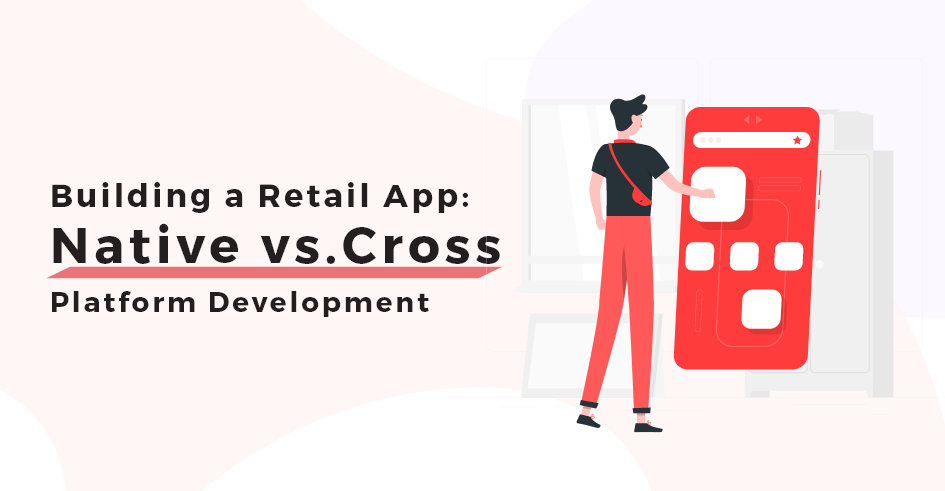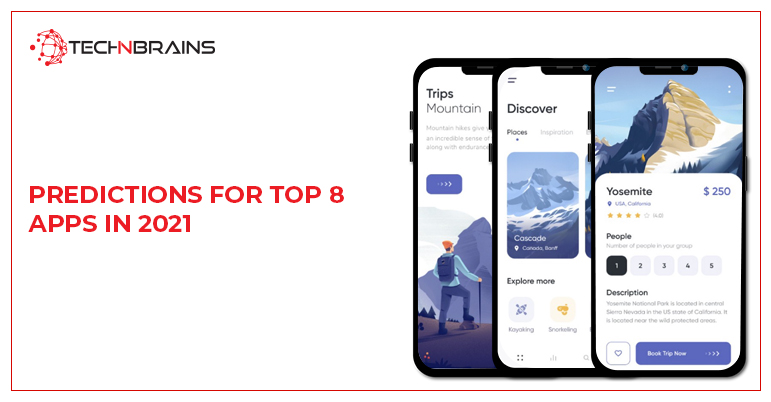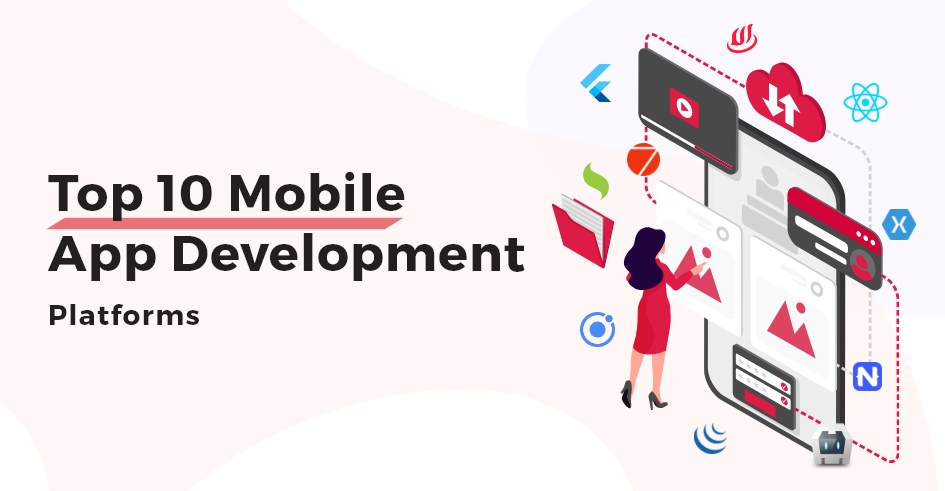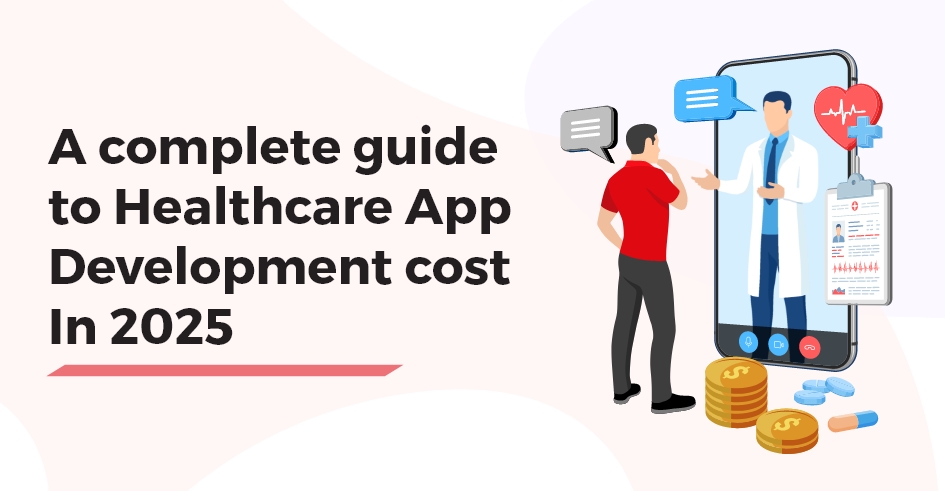Overview: Retail app development has helped businesses grow in no time; learn if you should for Native or Cross-Platform App Development for greater ROI.
Are you an entrepreneur looking for immense growth? then retail app development is the one you are looking for. With 2023 incubating digital growth for mobile apps, digitalization is the top priority for startups and business owners. Back then who would’ve thought you could make bank transactions with just a tap, have your favorite meal delivered with food delivery apps or even learn how to patent an app idea from the comfort of their homes. In this blog you will be learning about:
- How To Create a Retail App
- Key Features to Add in Retail App
- How Much Does It Cost to Create Retail App Development
- Native vs. Cross-Platform App Development for Retail
- Pro Tips For Retail Businesses
What are Retail Mobile Apps
A retail app is a software solution that facilitates online commercial transactions between consumers and businesses. These apps are not just tools for making purchases; they’re companions that enhance the entire shopping experience. Retailers can harness the power of Retail App Development to gather invaluable insights into customer behavior and preferences, driving strategic decision-making and marketing efforts.
How Retail Apps helped us
It’s remarkable how, just a few years ago, the idea of a mobile app connecting you with your distant loved ones, booking a cab, your daily steps, delivering meals to your doorstep, purchasing tickets, and offering a wealth of information about everything was merely a concept. Today, the power to access such conveniences is just a few taps away. In this new era, consumers can effortlessly procure goods through retail apps.
The rise of digital technology has brought about a revolutionary change in the way sellers reach out to their customers worldwide. With Retail App Development connecting buyers and sellers from every corner of the world, shopping has never been more convenient. This not only gives sellers access to a global user base but also enables customers to enjoy the luxury of shopping from the comfort of their own homes. The idea of a mobile app that bridges the gap between buyers and sellers was once a distant dream, but technology has made it a reality. This transformation has brought a new era to the retail industry, making it more accessible and efficient than ever before.
Analyzing the Retail App Market
Before we delve deeper into the nuances of retail app development, let’s examine some market statistics that shed light on the significance of this industry in the years to come.
- 72% of consumers believe that mobile apps make buying more convenient.
- In the previous month, 58% of people claim that they had used a shopping app.
- 49% of shopping app users use apps to get discounts or special deals, while 37% indicated they will use a shopping app specifically to make a purchase.
- 58% of millennials report using apps more frequently than the mobile web.
- 71% of respondents who have used retail apps said they enjoy using mobile applications to shop.
- 57% of them stated they regularly shop using mobile apps. Furthermore, 46% stated that they are more inclined to shop using mobile apps than online.
How To Create a Retail App
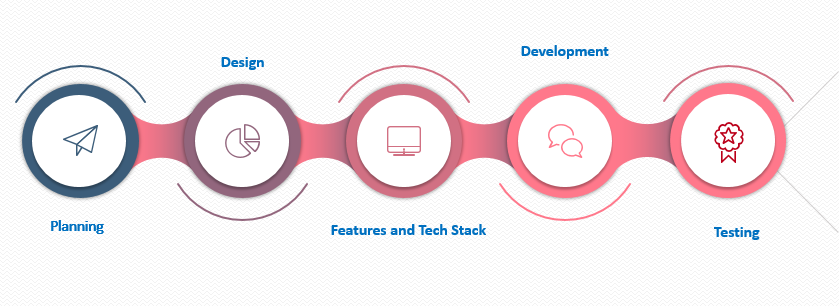
Embarking on the journey of retail app development involves several critical steps that span the entire app development process. Let’s guide you through these pivotal stages, ensuring your project’s success.
- Planning/Discovery Phase: This initial stage involves in-depth research to understand the requirements of your business model. It’s crucial to select a retail app development company, define features, and conduct market research to establish a robust foundation for your app.
- Design: The design phase is where your app takes shape visually. A well-designed user interface and user experience are paramount in today’s interconnected world. Social networking integration and unique features enhance user engagement, and choosing a development company that understands your vision is crucial.
- Features and Tech Stack: Innovative features and a robust tech stack are the building blocks of a successful retail app. Our section below outlines essential features and the technology stack used in retail apps, providing you with valuable insights.
- Development: Once you’ve grasped the feature set and technology, it’s time to engage the services of a top-tier retail app development company in the USA. Collaborate closely to integrate your app’s critical features, ensuring a seamless user experience.
- Testing: Beyond development, rigorous testing is a non-negotiable phase. Testing identifies and rectifies any errors or bugs before launch, safeguarding your app’s reputation and user experience.
Key Features in Retail App Development
Below are some of the key features that will take your retail app to the next level:
Customer Panel – Retail App Development

- Sign up/Sign In: Simplify user onboarding with straightforward sign-up and sign-in processes.
- Order History: Enable users to track their past purchases and review order details.
- Address: Streamline the delivery process by allowing users to store multiple delivery addresses.
- Wish List: Enhance the shopping experience with a wish list feature for bookmarking products.
- In-App Wallet: Offer an encrypted wallet for convenient fund management.
- Categories: Organize products into categories for easy navigation.
- Search Filter: Facilitate product discovery through a user-friendly search filter.
- Notifications: Keep users updated on the latest news and events via an in-app notification bar.
- Cart: Allow users to add items to their cart for a seamless shopping experience.
- Track Order: Provide real-time order tracking for transparency and convenience.
- Payment Gateway: Ensure secure payments through integrated payment gateway options.
- Text Notification: Keep users informed about orders and shipping details via SMS notifications.
Admin Panel – Retail App Development

- Content Management: Admins can add, edit, and remove products, pricing, and user information.
- Inventory Control: Maintain control over inventory by updating product information.
- Product Specifications: Offer detailed product information for a smooth shopping experience.
- Order Management: Manage orders effectively with order tracking and logistics management.
- Real-Time Reports and Analytics: Stay updated with real-time reports and analytics.
- Payment Management: Streamline payment confirmation and evaluation processes.
Estimating the Cost of Retail App Development
Before venturing into retail app development, it’s crucial to gauge the associated costs. The development of a retail app’s price tag can vary significantly based on several factors, including:
- App complexity
- App size
- Platform selection
- Mobile app development company fees
- Development timeline
To provide an approximate cost for Retail App Development, small businesses may spend between $8,000 and $12,000, medium-sized organizations between $15,000 and $20,000, and large-scale enterprises between $20,000 and $25,000. However, it’s vital to note that these figures can fluctuate based on the specifics of your project.
In Closing, your journey through the intricate world of retail app development begins here. By understanding the core elements of this dynamic industry, you are well-prepared to navigate the challenges and opportunities that lie ahead. So, without further ado, let’s delve deeper into this blog and equip you with the knowledge on whether to choose native or cross-platform to make your retail app dreams a reality.
Native vs. Cross-Platform App Development for Retail App Development
When it comes to retail app development, you face a critical decision: should you opt for native app development or cross-platform app development? Let’s explore the basics and then Native vs. Cross-Platform App Development so that you can make an informed decision.
Native App Development
Native app development involves creating a dedicated mobile app for a specific operating system, such as iOS app development or Android app development. These apps are designed using platform-specific languages and development tools, like Swift for iOS and Java or Kotlin for Android. Here are some key advantages of native app development for retail app development:
Better Performance
Native apps are renowned for their superior performance, as they are optimized to its fullest. They provide smoother user experiences through the host device, resulting in faster load times and smoother user experiences.
User Experience
Native apps provide a seamless and intuitive user experience, aligning with the platform’s design and user interface guidelines. This familiarity enhances user engagement and satisfaction.
Access to Device Features
Native apps can tap into a device’s hardware and software features, such as camera access, GPS, and push notifications. This opens up possibilities for creating highly interactive and feature-rich retail apps.
Security
Native apps benefit from the stringent security measures of their respective platforms, ensuring the protection of sensitive customer data.
Cons
Building separate apps for iOS and Android can be time-consuming and costly. You need to maintain two separate codebases, which can be challenging. Any updates or changes need to be implemented twice, once for each platform.
When to Choose Native for Retail
- High-end retail brands, where user experience is paramount, should opt for native Retail App Development to provide a premium shopping experience.
- If your retail app is central to your business model and generates a significant portion of your revenue, native is the way to go.
- When your app requires access to advanced device features, like AR technology or in-depth analytics, native is the better choice.
Cross-Platform App Development
Cross-platform app development for Retail App Development involves building a single app that can run on multiple platforms. This is achieved through frameworks like React Native, Flutter, or Xamarin. Here’s why cross-platform development is an attractive choice for retail apps:
Cost-Effective
Building a single app that works on both iOS and Android can be more cost-effective than creating two separate native apps.
Faster Development
Cross-platform development often leads to faster time-to-market, as you’re working with a single codebase.
Consistency
Cross-platform apps can maintain a consistent look and feel across different platforms, simplifying branding and user experience.
Simplified Maintenance
Updates and bug fixes can be implemented once and applied to both iOS and Android, streamlining maintenance.
Cons
Cross-platform apps may not perform as well as native apps, particularly for resource-intensive tasks. Access to certain device features may be restricted, limiting the functionality of your app. While improving, the user experience may not be as seamless as native apps.
When to Choose Cross-Platform for Retail
- Smaller businesses with limited resources can benefit from cross-platform development as it’s cost-effective.
- If you want to test an app concept quickly and cost-effectively, cross-platform development is ideal.
- If your retail app doesn’t require extensive use of device-specific features and aims for a broader reach, cross-platform can suffice.
The Right Choice for Your Retail App
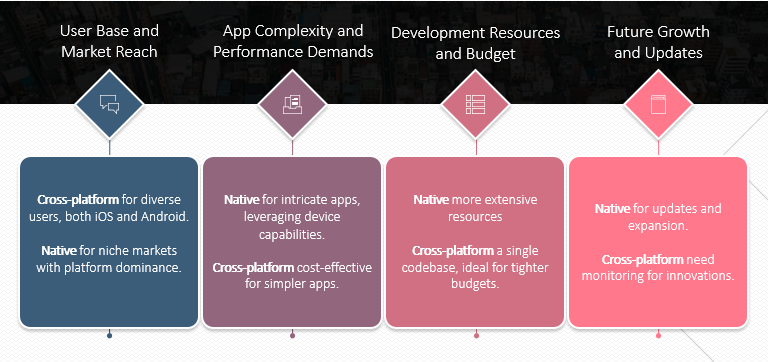
Making the right choice between native and cross-platform app development for your retail app is a crucial decision that will significantly impact your app’s performance, user experience, and long-term success. Let’s delve deeper into the factors that can guide your choice and explore scenarios where one approach might be more suitable than the other:
User Base and Market Reach
Consider your target audience and geographical reach. If your retail business serves a diverse customer base using various devices and platforms, cross-platform development can provide a wider reach. It allows you to cater to both iOS and Android users without disproportionately favoring one over the other. This can be particularly advantageous if you’re looking for Retail App Development to expand globally and wish to minimize development costs.
On the other hand, if your retail business caters to a specific niche or region where one platform dominates, such as iOS in North America or Android in certain emerging markets, you might prioritize native development for a more optimized user experience.
App Complexity and Performance Demands
The complexity of your retail app plays a pivotal role in the development approach you choose. If your app involves intricate features, high-performance demands, or real-time data processing, native development is likely the preferred route. Native apps can take full advantage of the device’s hardware capabilities and deliver seamless and responsive experiences, critical for complex retail applications.
Conversely, for less complex retail apps that focus on content delivery, online shopping, and simple user interactions, cross-platform development can be a cost-effective choice. You can reach a broader audience without compromising on essential functionality.
Development Resources and Budget
Your available development resources, including budget and time, are vital considerations. Native development typically requires separate development teams and more extensive resources. If you have the financial means and are willing to allocate the necessary time and budget for both iOS and Android development, native apps can offer the best performance and user experience.
Cross-platform development shines in resource efficiency. You can save time and money by maintaining a single codebase. This is a compelling option for businesses with tighter budgets or shorter timeframes. Keep in mind, however, that while cross-platform development may be less costly upfront, it might incur additional costs in the long run for addressing performance optimization and potential framework updates.
Future Growth and Updates
Consider your retail app’s long-term prospects. Native apps offer greater flexibility for future updates and feature enhancements. You have complete control over optimizing your app for each platform, ensuring it remains competitive as technologies evolve. If you anticipate significant future growth or plan to introduce advanced features, native development offers a more robust platform for expansion.
Cross-platform apps may require a closer eye on the evolution of the selected framework and potential compatibility issues. They are well-suited for rapid development cycles and feature updates, but if your retail business has ambitions of pushing the boundaries of innovation, native development may offer more latitude.
User Experience and Branding
The user experience is a cornerstone of retail app success. Native apps provide a tailored experience consistent with each platform’s design and user interface guidelines. This can enhance brand identity and user engagement. If you prioritize a finely tuned and platform-specific user experience, native development is the way to go.
Cross-platform development can deliver a consistent look and feel across platforms, ensuring a unified brand identity. While it may not provide the same level of platform-specific optimization, it offers efficiency in delivering a cohesive brand experience.
PRO TIPS FOR RETAIL BUSINESSES
If your retail business falls into any of these categories, go for:
- Fashion Retailer: A high-end fashion brand focusing on premium user experience and augmented reality (AR) features should opt for native development.
- Local Grocery Store: A neighborhood grocery store aiming for cost-effectiveness and a simple shopping experience can benefit from cross-platform development.
- Electronics Retailer: A retailer dealing in electronics, where access to device features is essential for product demos and reviews, should choose native development.
- Online Marketplace: A large online marketplace catering to various vendors and products may find cross-platform development cost-effective and time-efficient.
In the end, your choice between native and cross-platform app development hinges on a thorough assessment of your retail app’s unique needs and your strategic business goals. It’s a decision that requires careful consideration, and there is no one-size-fits-all answer. By aligning your choice with your target audience, app complexity, available resources, long-term plans, and desired user experience, you can make an informed decision that positions your retail app for success in the dynamic and ever-evolving retail landscape.
TechnBrains – Your Retail App Development Partner
Choosing the right partner for app development is paramount, and TechnBrains is the ideal choice for several compelling reasons. With a dedicated team of experts, we bring a wealth of knowledge and understanding of the retail industry to the table. Our tailored solutions cater to the unique needs of your retail business, whether you’re a fashion brand, local grocery store, or electronics retailer.
We pride ourselves on staying at the forefront of technology trends, ensuring that your retail app is equipped with cutting-edge features and capabilities. User-centric design is a core focus, guaranteeing an intuitive and visually appealing app. Seamless integration with your existing systems, robust data security, and a commitment to your long-term success are at the heart of what we do.
In the fiercely competitive retail market, TechnBrains provides the differentiating factor you need to thrive. We’re not just a development partner; we’re your pathway to success in the digital realm. Choose TechnBrains for retail app development that exceeds industry standards and empowers your business to excel.


